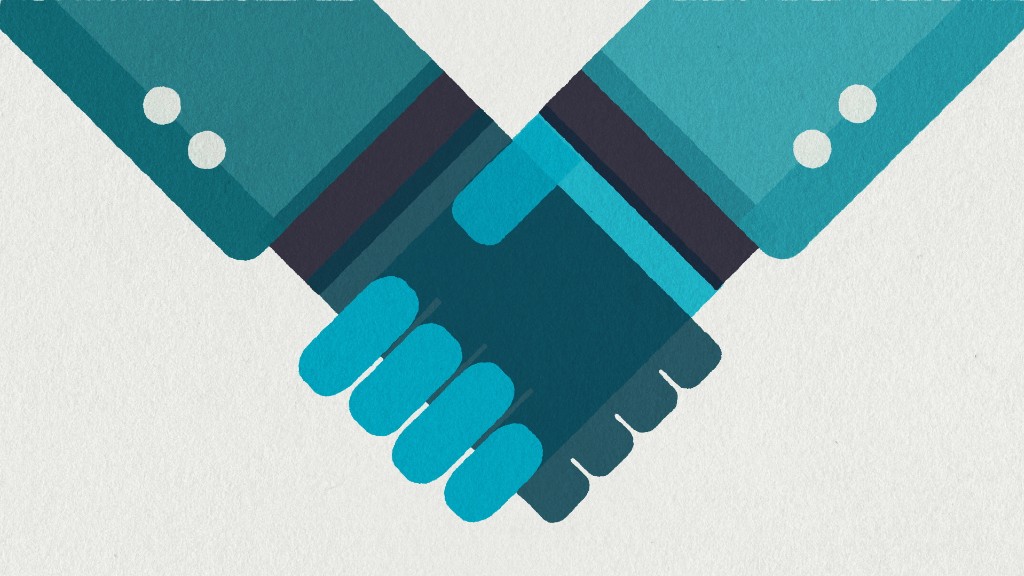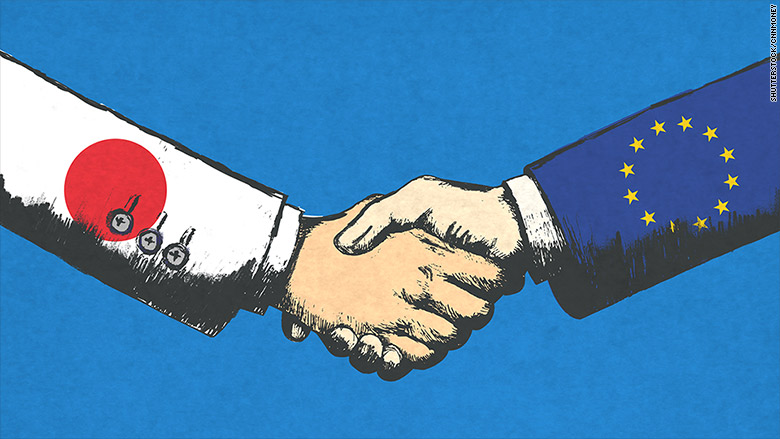
Japan and the European Union have a message for President Trump: Free trade is alive and well.
On the eve of a G20 summit with Trump, the leaders of Europe and Japan signed a free trade agreement covering more than 600 million people, 30% of the global economy and 40% of total world trade.
They made clear that even as Trump shuns multi-nation trade deals, others are ready to forge ahead with them.
"We were able to demonstrate a strong political will to the effect that Japan and the EU will hoist the flag of free trade high amid protectionist trends," Japanese Prime Minister Shinzo Abe told reporters.
Here are 3 reasons why Trump may hate the new deal.
1. It could hurt U.S. companies
The new deal will remove barriers to EU-Japan trade, but put some American companies at a disadvantage.
Case in point: cars. Under the agreement, Europe will gradually scrap tariffs on imported Japanese cars.
In turn, Tokyo has agreed to bring its standards for cars into line with the EU, which will make it easier for European automakers such as Volkswagen (VLKAY) and BMW (BMWYY) to sell their vehicles in Japan.
That could squeeze American automakers, who face 10% tariffs on exports to the EU. They'll also face tougher competition in the Japanese market. After a similar deal with Seoul in 2011, European car exports to South Korea trebled in just four years.
The Trans-Atlantic Trade and Investment Partnership, a big trade deal between the EU and the U.S. that has stalled, would have removed import duties on American cars in Europe.
But there's little prospect of those talks being revived in the current strained atmosphere.

2. It has the Paris climate deal at its heart
The deal is the first trade agreement that includes a specific commitment to implement the Paris climate accord, signed in 2016 with the aim of limiting global warming.
Trump is pulling America out of the Paris agreement, putting the U.S. in the company of only Nicaragua and Syria.
That could make it harder for the U.S. to strike trade deals, because of the precedent set by Europe and Japan.
"They have signaled that future trade agreements will include Paris as part of the rules," said Celine Bak, climate policy expert and senior fellow at the Centre for International Governance Innovation, an independent think tank based in Canada.
If the U.S. isn't able to commit to the Paris agreement, potential trade partners may look elsewhere, Bak said.
3. It involves lots of countries
Trump doesn't like multilateral trade deals.
He pulled the U.S. out of the Trans Pacific Partnership, a trade deal between the U.S. and 11 other nations around the Pacific Rim, just days into his presidency. He also vowed to renegotiate NAFTA and slammed the Trans-Atlantic Trade and Investment Partnership.
Instead, he prefers to deal with countries individually.
"Trump's embrace of bilateral negotiations is borne out of his understanding of the global economy as a zero-sum conflict," Geoffrey Gertz, a fellow at Brookings Institution, wrote in an article.
While the EU negotiates trade deals as one, it represents the competing interests of 28 countries (27 after Brexit).
That they were able to pull together to do a deal with Japan, just months after signing a similar deal with Canada, shows this type of cooperation still has a future.
"The EU-Japan announcement on a trade deal framework -- big G20 splash and all -- is a stark and sobering challenge to the U.S. geopolitical role," said Nate Olson, a trade specialist at the Stimson Center think tank in Washington, D.C.
Japan's Abe said the deal could be the inspiration for future multilateral trade agreements.
"I have constantly tried to explain the significance of the TPP to President Trump. How the TPP is not a win or lose, and how for all the member countries it's a positive," said Abe. "Unfortunately, at this moment, the U.S. have withdrawn."


